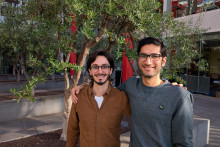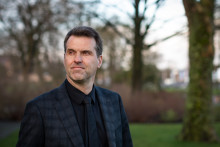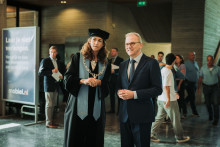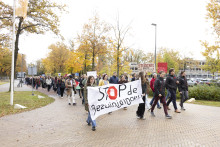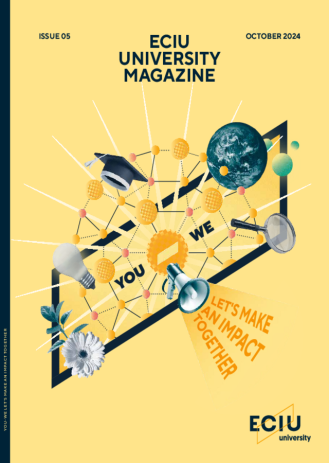Could this be considered a kind of P-NUT spin-off?
Wolfel Sanchez: ‘No, this is not a P-NUT spin-off, though the P-NUT board has been very supportive in helping us starting this up. The idea originated when Ashkan and I were talking about postdoc life in general. We are from different departments and noticed that there wasn’t really a network in place that goes beyond departments, for every postdoc. Basically, there wasn’t a postdoc community at the UT – yet.’
Ghanbarzadeh-Dagheyan: ‘P-NUT is a network for PhD and EngD candidates; postdocs are mostly invited to the informal, fun events. At first, we thought this Postdoc Network could become like a sub-committee of P-NUT, since PhD candidates may want to do a postdoc later and in that case they would already be familiar with this initiative. But currently there are some obstacles in the way of that idea. That’s something to maybe consider for the future, since that would also mean a change of the P-NUT statute as an association. We first want to start up this network and see where things go.’
Why is it important for you to create this community?
Ghanbarzadeh-Dagheyan: ‘Being a postdoc can feel lonely sometimes, but it does not have to be. This network is a way of saying that you do not have to suffer and face the hardships alone. We can support each other, share our concerns, and work towards solving them together. Being a postdoc comes with certain challenges, that are also quite different from the challenges PhD candidates tend to face.’
Wolfel Sanchez: ‘For instance, you do not have a thesis to submit. But you do have to write papers, do your research, help to acquire grants… Academia can be a very competitive environment and as a postdoctoral researcher, you usually have a quite limited time to achieve what you want to achieve. And since many postdocs are from abroad, it can be quite stressful and eventful in the beginning. There are some hurdles to overcome, I’d say.’
Would this network mostly focus on the practical side of things?
Ghanbarzadeh-Dagheyan: ‘Not necessarily, although a website to get new postdocs started well is something we want to create. The UT does offer information, but not in an organized way, so you have to know where to find it. It’s also important to know how to best deal with temporary contracts – because of Dutch legislation, for instance. But we definitely want to make this network a bit broader than the practical stuff. Some postdocs may want to pursue a career in industry. So we could help by offering workshops about career opportunities in industry. While others maybe fancy a career in academia. In those cases a workshop about grant writing could be beneficial. Postdocs can even help each other out when applying for grants. And of course, the fun and social events are also worth organising.’
Wolfel Sanchez: ‘There are also postdocs who haven’t really figured out whether academia or industry could be a good fit for them. PhD candidates have a roadmap, tenure trackers have a roadmap… We think it could also be very helpful if we create an optional roadmap for postdocs. There is a lack of information in that regard, how postdocs can shape their time and work here.’
On 3 December you will have a kick-off event. What is to be expected?
Ghanbarzadeh-Dagheyan: ‘As of now, we have a confirmation of about thirty attendees. That’s already a nice crowd size, but there is definitely room for more. We do not know how big the postdoc community potentially is; HR was also unable to supply any accurate numbers. We are still organizing and promoting the event. Two other postdocs, David Thomson and Hadi Mirgolbabaee, have also been helping us to prepare for the event. ’
Wolfel Sanchez: ‘Part of the kick-off event is also trying to figure out what people actually would expect from this network. That’s why we also want to set up a survey and have an open discussion during the event. We open the floor to everyone and welcome all suggestions.’


